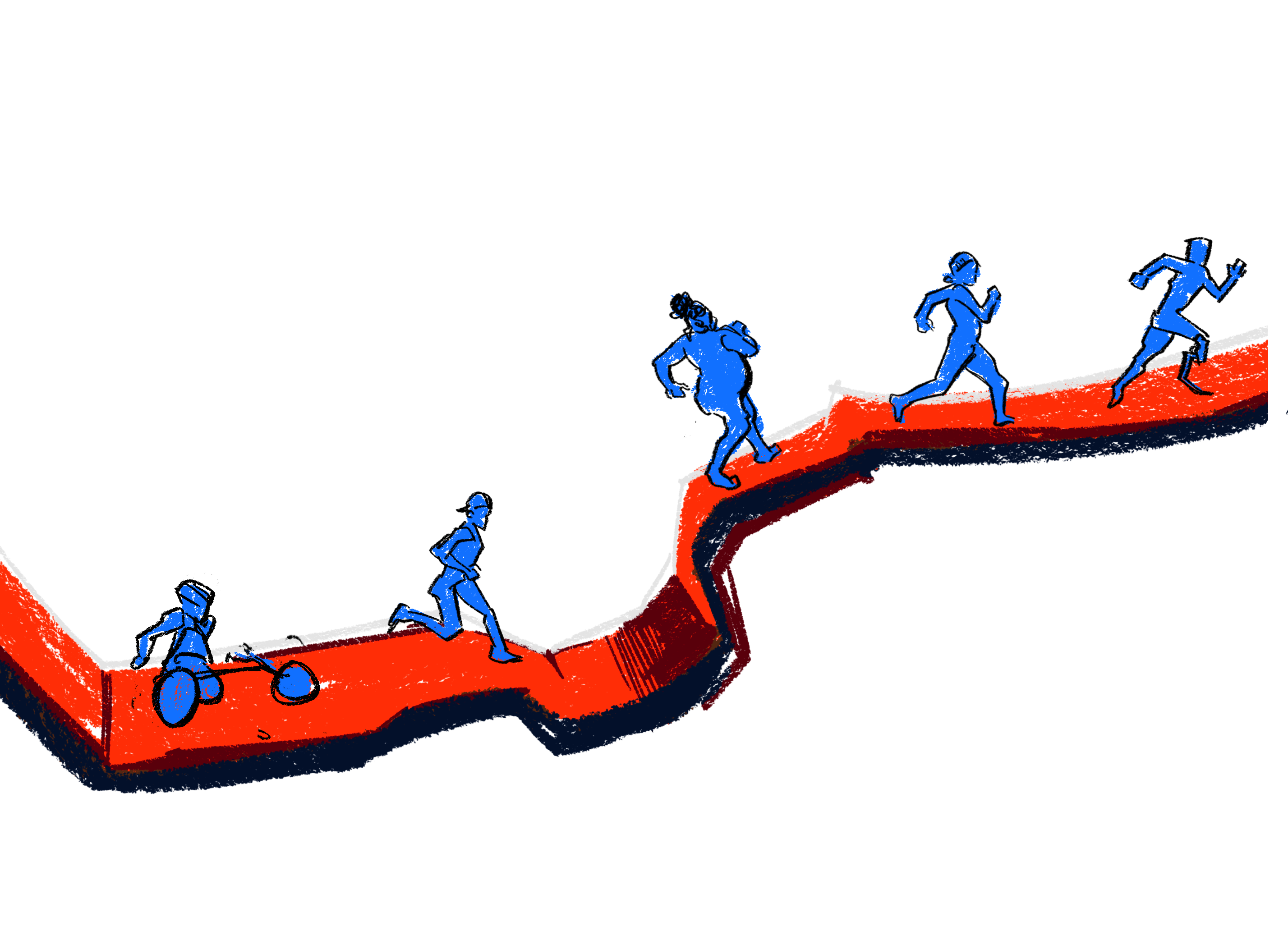As a concept, running is a sport that can come hand-in-hand with scrutiny. Many people who don’t run—and even sometimes those who do—might have ideas about what it means to be a runner. How fast someone runs, how many races they’ve competed in, and even what a person looks like might be misconstrued as determining whether someone is worthy of being deemed a so-called “real runner.”
Of course, none of these factors are necessary to being a runner. Anyone who runs is a runner, regardless of their pace, goals, or even fitness. And these ideas, which once weren’t given much airtime, are now surging into popular consciousness. Thanks to both the pandemic-induced surge in running’s popularity and the continued rise of fitness influencers, running is in what could be considered a renaissance.
Thus increased interest has opened the door for continued and heightened discourse about runners and the stereotypes surrounding them; it’s becoming clearly understood that being a runner is about nothing more than the act of running itself. For people with chronic illnesses, autoimmune diseases, and disabilities, this conversation gives them a lane to speak about their experiences and to highlight the fact that assumptions about what running looks like are rarely accurate.
Perhaps it’s better to say that running is undergoing not a renaissance, but a redefinition. Here are the stories of some of the people making that reformulation possible.
“I learned how to use my running as a revolt” – Latoya Shauntay Snell
As a podcaster and social media activist, Latoya Shauntay Snell is very familiar with the scrutiny that can come with putting your running journey out into the public sphere. Her perspective on the sport has been shaped by her identity as “a plus-size, queer, Black, and chronically ill woman.” Faced with mobility issues and chronic illnesses impacting her reproductive system, Snell has had to adapt her style of training so that she can meet her goals without harming herself in the process.
“Living with two handfuls of medical conditions means that I have to listen to my body’s needs and desires more than the average person … I know that if I push myself beyond my limit, I may not be able to run at all.”
Because she trains in the ways that are best for her body, Snell has run 28 marathons and six ultramarathons, a deeply impressive achievement. And in doing so, she has pushed back against the stereotypes that often surround long-distance runners—particularly those that relate to appearance and mentality.
“Society is sold that long distance runners have to be lean, eat super clean, and [that] their personalities are all about being laser-focused on nothing but the sport,” she explained in an email to the Voice.
Snell deconstructs these ideas and utilizes her lived experience to teach others that there is no right way to be a runner. Via her social media presence and podcast, she shows thousands of people every day that to be a runner is simply to run—with no other strings attached.
“Countless people paved the way for all of us to show up looking, talking and being ourselves in this sport,” Snell wrote. Now she’s one of those people, working to blaze her own trail in the digital age.
“We are just as capable as anyone else” – Olivia Nice
Olivia Nice was one of the many people who took up running during the COVID-19 shutdowns; she thought it would help her “deal with the frightening, changing world” brought about by the pandemic. What started out as a way to cope quickly became a passion, and she now has a running-centered TikTok account with over 4,000 followers. She describes her platform as “a safe space for slow running girlies” and posts on social media to encourage people who might feel insecure or judged for running with a disability.
“Being disabled [in the running world], it is very easy to feel different and left out,” she said, highlighting the frustration she sometimes feels when she compares her pace or achievements to those of her peers. But by taking to TikTok and sharing her journey, she has found a space both on the internet and in her own head where she can help change what running means and looks like.
“I want to increase representation … we are just as capable as anyone else.”
“I know I can endure” – Adam Wasson
Unlike Nice and Snell, Adam Wasson is not an influencer. He is, however, a lot of other things—a professional ghostwriter, the parent of a Georgetown senior, a self-described “persevering badass,” and, of course, a runner.
For Wasson, running and having Crohn’s disease often go hand in hand—but sometimes in ways that might not be apparent. For example, he talked with the Voice about nutrition being a space in which running and Crohn’s complement each other.
“The diet that you eat with Crohn’s disease is really similar to the kind of optimal diet while you’re in the midst of a suffer-festy run … You’re just eating simple carbs. So I am like the simple carb master.”
More than diet, though, Wasson feels that Crohn’s and running are linked in the matter of perseverance. A lot of the experiences he’s had—and the things he learned about himself contained within those moments—have applied to having a chronic illness just as much as they apply to long-distance trail running.
“Suffering through an illness, a bout of an illness or a flareup of an illness, is not so unlike suffering through a really, really hard, long ultra[marathon] … You’re like, okay. I’m just going to keep going. I’m not going to give up. I feel really shitty, and I’m going to keep going until this is done.”
In a world where runners are boxed in by preconceived notions at every turn, Snell, Nice, and Wasson are putting themselves and their stories out there, hoping to widen the scope of what society thinks when they hear the word “runner.”





